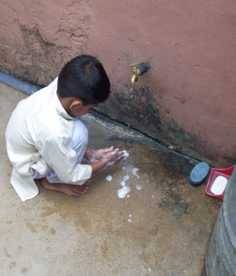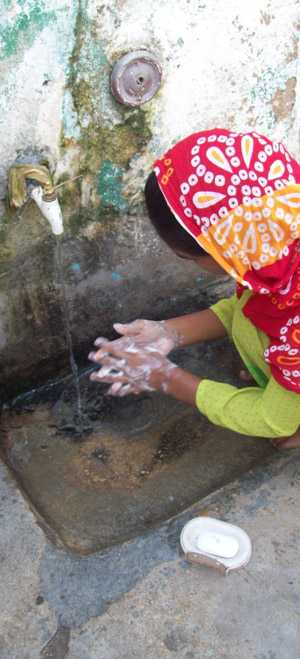Improving Child Development: A New CDC Handwashing Study Shows Promising Results
CDC at Work: Water-related Hygiene
Handwashing can help prevent diarrhea and pneumonia, two of the leading causes of death in children around the world.
Download Fact Sheet: Improving child development: A new CDC handwashing study shows promising results [PDF - 2 pages]

A boy in the developing world washing his hands with soap under an outdoor tap.
Sanitation and hygiene are critical to health.
Diarrheal diseases are common and largely preventable. Children are at particular risk for diarrhea and other diseases related to poor water, sanitation, and hygiene. Proper hygiene education is a critical step in reducing illness and death from diarrheal disease. In 2003, the Centers for Disease Control and Prevention (CDC) studied whether good hygiene can prevent diarrhea in young children 1. Some children in the study were given intensive handwashing promotion for 9 months, and others were not. Children whose families received soap for their handwashing stations and education about handwashing experienced approximately half as much diarrhea as children in a control group during the first 2 1/2 years of their lives, a critical time in their development 1.
What does handwashing have to do with healthy child development?
The same children who participated in the 2003 study were followed up in 2009 2. In addition to having had less diarrhea, the children who got handwashing promotion also scored better in a detailed test of their development when they were 5–7 years old. These findings suggest that handwashing promotion could be an important strategy for improving child welfare.
Heavy diarrhea or intestinal parasite loads in early childhood have been linked to delays in development 4-8. However, proper handwashing before meals and after going to the toilet can lower exposure to germs. This can lessen the chances of illness and chronic inflammation—leading to better nutrition intake, more energy available for growth and development, and better attendance at school 9, 10.
"…more than 200 million children under 5 years fail to reach their potential in cognitive development because of poverty, poor health and nutrition, and deficient care 3."
Important next steps
Transferring these findings to benefit the general public depends on strong partnerships and collaboration. In 2012, CDC presented these findings to 6,000 pediatricians at a meeting of the Pediatric Academic Societies and to a public-private partnership for handwashing with soap.
The challenge? To replicate these results in other settings and learn more about why handwashing had this sort of positive health effect in children.
What is needed? More robust data to understand how handwashing can work to improve children’s health and development—whether by decreasing exposure to germs, increasing parent-child interactions, or both. Meanwhile, increased handwashing advocacy can be beneficial to greater segments of society.

A girl in Pakistan washing her hands with soap under an outdoor tap.
Soap + water = Cleaner bill of health and disease prevention in children
Children who got handwashing promotion reached developmental milestones 6 months earlier than those who did not.
Children whose families were exposed to nine months of a handwashing promotion tended to score better across five areas of development:
Cognitive (skills and abilities commonly thought of as mental or intellectual, with the exception of language and communication skills)—Examples include finding hidden items in a complex picture, recalling facts from a story, and memorizing lines from books, TV shows, or songs.
Communication (how effectively a child receives and expresses information and ideas)—Examples include responding to “who” or “what” questions, associating pictures with words, and identifying family members or pets when named.
Motor (ability to control and use the large and small muscles of the body)—Examples include throwing a ball, hopping on one foot, and stacking cubes.
Personal-social (abilities that allow a child to engage in meaningful interaction with adults and peers and to develop a self-concept and sense of a social role)—Examples include sharing toys, expressing emotions, and showing pride in accomplishments.
Adaptive (ability to use information and skills from four other domains above)—Examples include using eating and drinking utensils, dressing themselves, washing their hands, and blowing their noses.
Proper handwashing in children: A call to action
Expand education to families and caretakers across society so that all children can obtain the health benefits from proper handwashing, and society can obtain the productivity benefits of a healthier population. This is a low-technology and accessible practice that can go hand-in-hand with other programs to promote child well-being, such as nutritional support and parenting education.
"There can be no sharper message to proponents of maternal and child health—that acting early in a child’s life reaps the highest reward both for individuals and
societies 11."
References
- Luby SP, Agboatwalla M, Painter J, Altaf A, Billhimer W, Keswick B, Hoekstra RM. Combining drinking water treatment and hand washing for diarrhoea prevention, a cluster randomised controlled trial. Trop Med Int Health. 2006;11(4): 479-89.
- Bowen A, Agboatwalla M, Luby S, Tobery T, Ayers T, Hoekstra RM. Association between intensive handwashing and child development in Karachi, Pakistan: A cluster controlled trial. Arch Pediatr Adolesc Med. 2012 Sep; [Epub ahead of print]
- Grantham-McGregor S, Cheung YB, Cueto S, Glewwe P, Richter L, Strupp B, International Child Development Steering Group. Developmental potential in the first 5 years for children in developing countries. Lancet. 2007;369(9555):60-70.
- Oberhelman RA, Guerrero ES, Fernandez ML, Silio M, Mercado D, Comiskey N, Ihenacho G, Mera R. Correlations between intestinal parasitosis, physical growth, and psychomotor development among infants and children from rural Nicaragua. Am J Trop Med Hyg. 1998;58(4):470-5.
- Patrick PD, Oriá RB, Madhavan V, Pinkerton RC, Lorntz B, Lima AA, Guerrant RL. Limitations in verbal fluency following heavy burdens of early childhood diarrhea in Brazilian shantytown children. Child Neuropsychol. 2005;11(3):233-44.
- Lorntz B, Soares AM, Moore SR, Pinkerton R, Gansneder B, Bovbjerg VE, Guyatt H, Lima AM, Guerrant RL. Early childhood diarrhea predicts impaired school performance. Pediatr Infect Dis J. 2006;25(6):513-20.
- Berkman DS, Lescano AG, Gilman RH, Lopez SL, Black MM. Effects of stunting, diarrhoeal disease, and parasitic infection during infancy on cognition in late childhood: a follow-up study. Lancet. 2002;359(9306): 564-71.
- Niehaus MD, Moore SR, Patrick PD, Derr LL, Lorntz B, Lima AA, Guerrant RL. Early childhood diarrhea is associated with diminished cognitive function 4 to 7 years later in children in a northeast Brazilian shantytown. Am J Trop Med Hyg, 2002. 66(5): p. 590-3
- Humphrey JH. Child undernutrition, tropical enteropathy, toilets, and handwashing. Lancet. 2009;374(9694):1032-5.
- Bowen A, Ma H, Ou J, Billhimer W, Long T, Mintz E, Hoekstra RM, Luby S. A cluster-randomized controlled trial evaluating the effect of a handwashing-promotion program in Chinese primary schools. Am J Trop Med Hyg 2007;76:1166–73.
- Early child development—a winning combination. Lancet. 2011;378(9799):1276.
- Page last reviewed: May 4, 2015
- Page last updated: May 4, 2015
- Content source:


 ShareCompartir
ShareCompartir